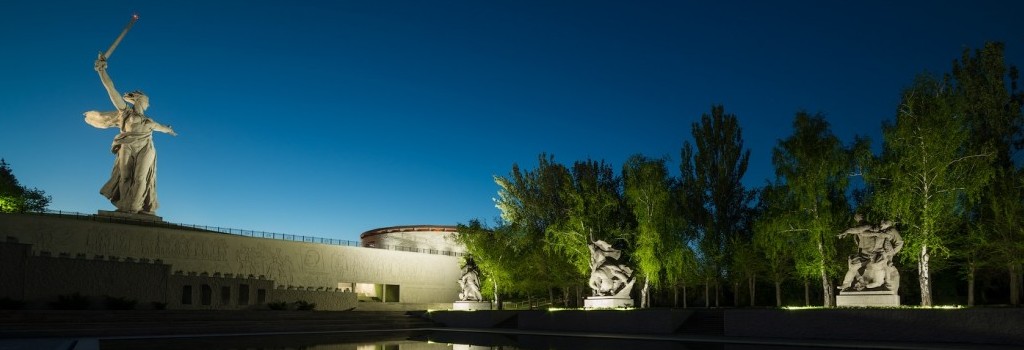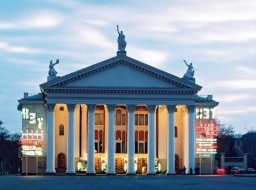
| Sort by: | Currency: |
Customer TestimonialsPlease be aware that we thought that Victoria was an excellent guide and a charming personality with whom to pass the day at the Hermitage. Our Highest Recommendation!

Michael McGowan Guided Hermitage Museum tour with All-Day Admission Ticket
Just want to say that my guide Valeria was terrific! Knowledgeable, pleasant and funny. I would recommend her to anyone.

 Tsaritsyn - Stalingrad – Volgograd is a great complex object of cultural and natural heritage. In Volgograd there are a lot of objects of archeological and historical heritage (historical memorials) of pre-revolution period of Tsaritsyn development. Volgograd is a picturesque city with a rich history. It is the largest historical and cultural center of the Lower Volga Region. Present-day Volgograd is one of the most beautiful cities in Russia. The city touches Volga River and Volga-Don Shi... Read more
Tsaritsyn - Stalingrad – Volgograd is a great complex object of cultural and natural heritage. In Volgograd there are a lot of objects of archeological and historical heritage (historical memorials) of pre-revolution period of Tsaritsyn development. Volgograd is a picturesque city with a rich history. It is the largest historical and cultural center of the Lower Volga Region. Present-day Volgograd is one of the most beautiful cities in Russia. The city touches Volga River and Volga-Don Shi... Read more
 Tsaritsyn - Stalingrad – Volgograd is a great complex object of cultural and natural heritage. In Volgograd there are a lot of objects of archeological and historical heritage (historical memorials) of pre-revolution period of Tsaritsyn development. Volgograd is a picturesque city with a rich history. It is the largest historical and cultural center of the Lower Volga Region. Present-day Volgograd is one of the most beautiful cities in Russia. The city touches Volga River and Volga-Don Ship Canal in the south-west, due to which Volgograd has become a port of five seas. The center of contemporary Volgograd is formed by the system of squares and avenues allocated on one axis at right angle to the Volga River. Its megacity attracts tourists from all over the world. Volgograd is a Hero- city with the legendary pages of Stalingrad Battle.
Tsaritsyn - Stalingrad – Volgograd is a great complex object of cultural and natural heritage. In Volgograd there are a lot of objects of archeological and historical heritage (historical memorials) of pre-revolution period of Tsaritsyn development. Volgograd is a picturesque city with a rich history. It is the largest historical and cultural center of the Lower Volga Region. Present-day Volgograd is one of the most beautiful cities in Russia. The city touches Volga River and Volga-Don Ship Canal in the south-west, due to which Volgograd has become a port of five seas. The center of contemporary Volgograd is formed by the system of squares and avenues allocated on one axis at right angle to the Volga River. Its megacity attracts tourists from all over the world. Volgograd is a Hero- city with the legendary pages of Stalingrad Battle.
The city was renamed Stalingrad after Joseph Stalin on April 10, 1925. This was officially to recognize the city and Stalin's role in its defense against the Whites between 1918 and 1920. In 1931, the German settlement-colony Old Sarepta (founded in 1765) became a district of Stalingrad. Renamed Krasnoarmeysky Rayon (or "Red Army District"), it became the largest area of the city.
The first institute was opened in 1930. A year later, the Stalingrad Industrial Pedagogical Institute, now Volgograd State Pedagogical University, was opened.
Under Stalin, the city became a center of heavy industry and transshipment by rail and river. During World War II, German and Axis forces attacked the city, and in 1942 it became the site of one of the pivotal battles of the war. The Battle of Stalingrad had perhaps the greatest casualty figures of any single battle in the history of warfare (estimates are between 1,250,000 and 1,798,619). The battle became a titanic struggle between Hitler and Stalin as both saw it of great propaganda value, each keenly aware of the namesake of the city, and each poured hundreds of thousands of men into the battle.
The battle began on August 23, 1942, and on the same day, the city suffered heavy aerial bombardment that reduced most of it to rubble. By September, the fighting reached the city center. The fighting was of unprecedented intensity; the city's central railway station changed hands thirteen times, and the Mamayev Kurgan (one of the highest points of the city) was captured and recaptured eight times. By early November, the German forces controlled 90 percent of the city and had cornered the Soviets in two narrow pockets, but they were unable to eliminate the last pockets of Soviet resistance before Soviet forces launched a huge counterattack on November 19. This led to the encirclement of the German Sixth Army and other Axis units. On January 31, 1943 the Sixth Army's commander, Field Marshal Friedrich Paulus, surrendered, and by February 2, with the elimination of straggling German troops, the Battle of Stalingrad was over. In 1945 the Soviet Union awarded Stalingrad the title Hero City for its resistance. Great Britain's King George VI awarded the citizens of Stalingrad the jeweled "Sword of Stalingrad" in recognition of their bravery. As Stalingrad was destroyed during the war, in 1946, the construction of the modern city started. It included the memorial complex on the Mamayev Kurgan.
A number of cities around the world (especially those that had suffered similar wartime devastation) established sister, friendship and twinning links (see list below) in the spirit of solidarity or reconciliation. One of the first "sister city" projects was that established during World War II between Stalingrad and Coventry in the United Kingdom – both suffered extensive devastation from aerial bombardment.
On 10 November 1961, Nikita Khrushchev's administration changed the name of the city to Volgograd ("Volga City") as part of his programme of de-Stalinization following Stalin's death, as he was trying to reduce the "cult of personality". This action was and remains somewhat controversial, given Stalingrad's importance as a symbol of resistance during the war. During Konstantin Chernenko's brief administration in 1984, proposals were floated to revive its historic name. There remains a strong degree of local support for a reversion but intermittent proposals have yet to be accepted by the Russian government.
On May 21, 2007, the Communist Party obtained an important success in the Volgograd mayoral election. Communist candidate Roman Grebennikov was elected as mayor with 32.47% of the vote. Grebennikov is Russia's youngest mayor of a federal subject administrative center.
In 2010, Russian monarchists and leaders of the Orthodox organizations demanded that the city should return to its original name Tsaritsyn, but the authorities rejected their proposal.
On January 30, 2013, the Volgograd City Council passed a measure to use the title "Hero City Stalingrad" in city statements on nine specific dates annually. On the following dates the title "Hero City Stalingrad" can officially be used in celebrations:
- February 2 (end of the Battle of Stalingrad)
- February 23 (Defender of the Fatherland Day)
- May 9 (Victory Day)
- June 22 (start of Operation Barbarossa)
- August 23 (start of the Battle of Stalingrad)
- September 2 (Victory over Japan Day)
- November 19 (start of Operation Uranus)
- December 9 (Day of the Fatherland's Heroes)
In addition, 50,000 people signed a petition to Vladimir Putin, asking that the city's name be permanently changed to Stalingrad. President Putin has replied that such a move should be preceded by a local referendum and that the Russian authorities will look into how to bring about such a referendum.



